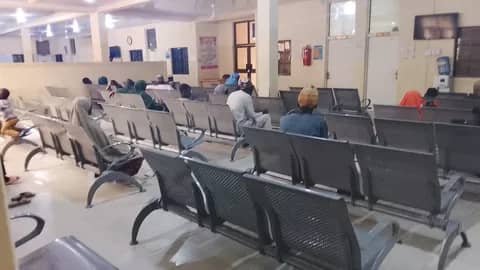The ongoing five-day nationwide warning strike declared by the Nigerian Association of Resident Doctors (NARD) has paralysed medical services in public hospitals across the country, leaving scores of patients stranded and, in some cases, desperate for urgent care.
At the Federal Medical Centre (FMC), Jabi, and the Wuse District Hospital, Abuja, PREMIUM TIMES observed heart-wrenching scenes on Saturday as the strike entered its second day.
In one case, a woman in labour was wheeled out of FMC Jabi to another facility after she was denied medical attention. Her relatives, visibly distressed, lamented the strike as they hurriedly sought alternative care.
A senior doctor at the facility, who requested anonymity, admitted his inability to intervene. He explained that resident doctors who form the backbone of hospital services had completely withdrawn from duty.
“Resident doctors are the foot soldiers of the hospital. Once they withdraw, the entire system is crippled,” he said.
Another patient, a woman in a burqa, recounted that she was attended to by a student doctor but was told her test results would not be available until the following day.
At Wuse District Hospital, the situation was equally dire. The usually busy atmosphere was replaced by an eerie calm. The Radiology Unit was locked, the emergency ward manned only by a few nurses, and no doctors were in sight. In the waiting area, a man lay sprawled across a seat, apparently too weak to leave after failing to receive care.
The industrial action, which commenced on Friday, follows the expiration of several ultimatums issued by NARD to the federal government.
The association is demanding the immediate release of the 2025 Medical Residency Training Fund (MRTF), payment of five months’ arrears arising from the revised Consolidated Medical Salary Structure (CONMESS), as well as settlement of other outstanding allowances.
In addition, NARD criticised the Medical and Dental Council of Nigeria (MDCN) for allegedly downgrading membership certificates obtained from the West African Colleges of Physicians and Surgeons, a move the association says undermines its members’ professional standing.
Resident doctors constitute the majority of medical personnel in Nigeria’s tertiary hospitals, and their withdrawal has historically disrupted services nationwide. With the strike now in full swing, fears are growing over its impact on patients requiring emergency care, especially in government-owned facilities that cater to the masses.
Health experts warn that unless the federal government moves quickly to address the doctors’ grievances, the situation could deteriorate into a full-scale shutdown of the country’s fragile healthcare system.




